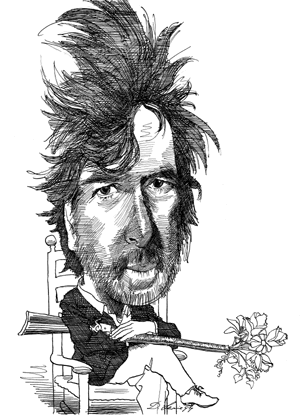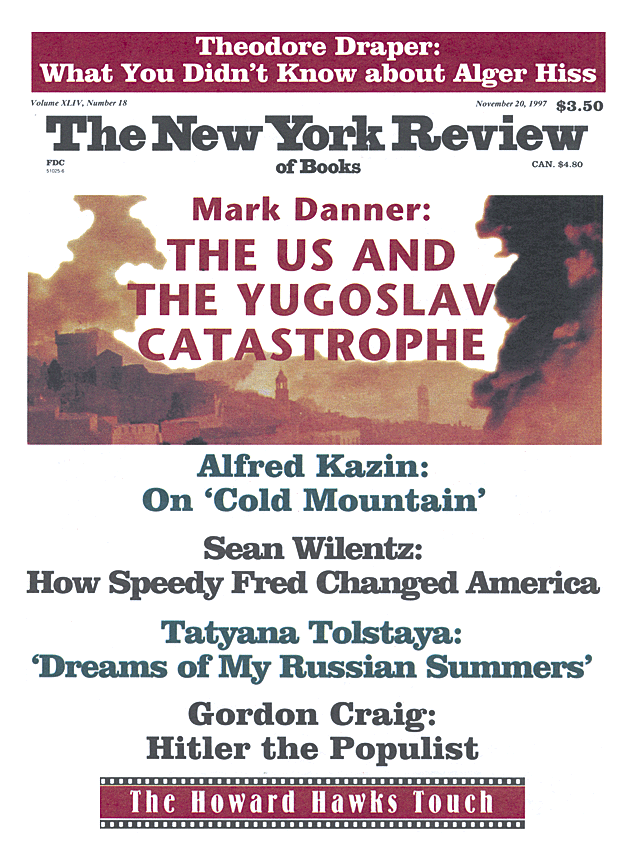Inman, a Confederate soldier beset by flies drinking at the neck wound he sustained in the Petersburg campaign (1864), is in a hospital ward. He is desperate to get out of the war and back to his mountain home in western North Carolina. Aman born blind asks Inman to describe his battle experiences. Inman wishes that he had been blind enough to miss the horrors he had seen at Malvern Hill, Sharpsburg, Petersburg. He dwells particularly on the battle of Fredericksburg (1862), the one-sided slaughter of so many thousands in the Union army under the hapless General Burnside. (The senseless carnage there depressed the North, and Lincoln said in despair, “If there is a worse place than Hell I am in it.”) Inman recalls a Confederate walking among the Union wounded with a hammer, finishing each one off with a blow to the head. He wanted their boots.
At Fredericksburg, “the Federals kept on marching by the thousands at the wall all through the day, climbing the hill to be shot down.” Robert E. Lee was triumphant, but admitted, “It is well that war is so terrible, or we should grow too fond of it.” Inman can still hear the “slap of balls into meat.” He is not one of Lee’s innumerable Southern worshippers.
Longstreet looked like a stout hog drover. But from what Inman had seen of Lee’s way of thinking, he’d any day rather have Longstreet backing him in a fight. Dull as Longstreet looked, he had a mind that constantly sought ground configured so a man could hunker down and do a world of killing from a position of relative safety. And that day at Fredericksburg was all in the form of fighting that Lee mistrusted and that Longstreet welcomed.
Inman is the man’s only name. In the course of his long, tortuous walk home (mostly by night) west along the back roads of North Carolina, he pictures Cold Mountain as the only haven left to him in the war-torn world. In his mind it is peacefully isolated, except for Ada, the gentlewoman from Charleston he met in her father’s mountain church. He loves her inarticulately, unsure that with her background, and with what war has made of him, she can ever love him. All we know about him, all he seems to know about himself, is that he is a damned good killer.
Curt, grave, and resourceful as he is—a ringer for Clint Eastwood—the Inman we get to see is just a man things are always being done to. He is the South itself in extremis. The land he walks, its folkways and its speech, are more fully and deeply realized for us than Inman himself. The eternally distant lovers are just a hopeless longing in Inman’s mind. But symbolically, the one book Inman carries is the endearing account of journeys through the Southern wilderness in the eighteenth century written by the pioneer naturalist William Bartram. Inman’s only bliss is reading Bartram.
The doings of that kind lone wanderer—called Flower Gatherer by the Cherokee in honor of his satchels full with plants and his attention all given to the growth of wild living things—never failed to ease his thoughts.
Charles Frazier’s own feeling for the Southern landscape is reverential and beautifully composed. He has written an astonishing first novel, if that is what it is. All the publisher tells us about Frazier is that he raises horses in North Carolina, and that the story is based on the long walk home of a great-greatgrandfather. The prose is so silky and arch in capturing the stiff speech of the period that the book must have had much unpublished work behind it. This gift of composition holds up a tale that tries to get past all the guilt and cruelty of the slave republic by directing the only real love in the book to the land itself. Inman, weary of everything about the war and for a brief moment thinking himself out of it, wonders, “What would be the cost of not having an enemy? Who could you strike for retribution other than yourself?”
…His spirit, he feared, had been blasted away so that he had become lonesome and estranged from all around him as a sad old heron standing pointless watch in the mudflats of a pond lacking frogs. It seemed a poor swap to find that the only way one might keep from fearing death was to act numb and set apart as if dead already, with nothing much left of yourself but a hut of bones.
Anxious not to provoke or offend, Inman cannot stay out of trouble. Since he is in civilian clothes, he is hunted down as an “outlier”—a man “out of it”—by the Home Guard seeking everywhere to round up every Southern male not in uniform. The Confederacy in these last desperate months of the war has become more and more the totally closed society the South had long formed around slavery.
Advertisement
The local head of the Home Guard is a violent man named Teague. Esco, a farmer who opposed the war and had remained generally sympathetic with the “enemy,” has grown bitter with both sides. The “big flatland cotton men” will wish “they’d chopped their own damn cotton.” The Yankee soldiers “came down on a family and looted their farm at grey dawn, stole every animal they could find and every bit of portable food they could carry, and set fire to the corncrib in parting.”
“Them’s the liberators,” Esco said. “And our own bunch is as bad or worse. Teague and his Home Guard roaring around like a band of marauders. Setting their own law as suits them, and them nothing but trash looking for a way to stay out of the army.”
Esco proceeds to tell the cruel and farcical story of how the Home Guard terrorized a farm couple suspected of burying “treasure.”
Teague claimed they were known to be lovers of the Federals and… whatever hoard of treasure they had must fall forfeit. First they took the house apart and then they prodded around in the yard with their sabers to see if they could find soft dirt from fresh digging. They slapped the man some, and later his wife. Then they hanged a pair of bird dogs each by each, and when that failed to get the man’s attention, they tied the woman’s thumbs together behind her back and hoisted her up by them with a cord thrown over a tree limb. Hauled on it till her toes just touched the ground. But the man still wouldn’t say word one, so they took her down and set the corner of a rail fence on her thumbs, but that didn’t faze the man either.
The children are wailing, and the woman with her thumbs still under the fence corner screams that she knew her man had hid the silver service and the hoard of gold pieces remaining after the hard times of the war. She just didn’t know where. She begs him to tell, then begs the guard to have mercy. When the husband still refuses to talk, she begs the guard to kill him first “so she could at least have the satisfaction of watching.”
While all this is going on in Inman’s world, Ada, his one hope in life, is helplessly alone on the farm in the west that her now deceased father Monroe, a tubercular clergyman from Charleston, had bought in the hope that the mountain air would restore him. Monroe was a bookish liberal in theology with a passion for Emerson. He had no idea that the hardbitten farmers to whom he enthusiastically preached his romantic gospel privately mocked him. One of them, claiming that the story of Christ was new to him, played the ignorant hayseed, stifling his laughter as Monroe formally told it to him.
Ada, brought up in the best society of Charleston, feels utterly abandoned and helpless until Ruby, the fiercely competent daughter of an itinerant fiddler, moves in and shows her everything she must do to restore the farm. There is a lot of useful information in these sections on how to keep an isolated backcountry farm going in bad times. All this documentary is charming because of Frazier’s feeling for the smallest side of rural life. But it is also clearly drawn out to keep the reader in suspense. When if ever will the separated lovers ever get together, as Inman on the road, Ulysses-like, has to get past one difficulty after another? Ruby, on hearing the story of Homer’s Odyssey, comments that Ulysses was evidently not in a hurry to get back to Ithaca. Inman is hurrying to Ada as best he can. But of course terrible Teague, whose menace continually hangs over the story, catches up with Inman not once but twice. The first time Inman, lined up with others to be shot, is merely grazed by the bullet and gets away. The second time confers tragedy upon the love story—a tragedy imminent throughout the telling of the story. This clearly expresses Frazier’s own sorrow—the noblest feature of the book—over the fate of the South and the devastation of so many Southerners.
There is a lot of sorrow here. Frazier, for all his love of country, his country, knows this is not enough and cunningly draws on the kind of rough old Southern humor that Mark Twain knew by heart but had to hold back even in Huckleberry Finn. My favorite instance of this is the chapter in Cold Mountain headed “like any other thing, a gift.”
Advertisement
Inman on the road at night comes on a man in a suit of black clothes and a white shirt carrying a torch and leading a horse by a lead rope tied around its neck. In the light Inman can see that the horse carries an unformed white thickness across its back like a drooping bundle of linen. Suddenly the man sits down in the road and moans to himself. “Lord, Oh, Lord,” he cries. “We once lived in a land of paradise.” When he gets to the edge of a bluff he lifts the bundle off the horse. Inman can see that what the man is lugging is a woman, one limp arm swinging, a cascade of black hair brushing the ground. The man is sobbing but is preparing to throw the woman off the bluff. Inman takes out his gigantic pistol, hits him with it, and the man says,
—I accept the merit of that.
—You merit killing, Inman said….
—Don’t kill me. I’m a man of God, the man said.
—Some say we all are, Inman said.
—A preacher is what I mean, the man said. I’m a preacher….
—Is she dead? Inman said.
—No.
—What’s the matter with her? Inman said.
—Not much. She’s somewhat with child. That and what I gave her.
—What would that be?
—A little packet of powders that I bought off a peddler. He said it would put a man to sleep for four hours. It’s been about half that since I dosed her up.
—And you’re the daddy?
—Apparently.
—Not married to her, I reckon?
—No….
—How did it come to this pass?
—In the normal way. A certain look of eye, bend of voice, brush of hand in passing the chicken when we had dinners on the ground following Sunday services….
—I now believe that when I took to preaching I answered a false call.
—Yes, Inman said. I’d say you’re ill suited for that business.
This Issue
November 20, 1997



